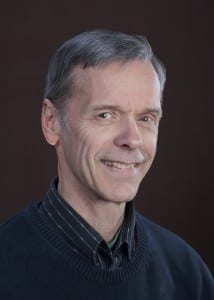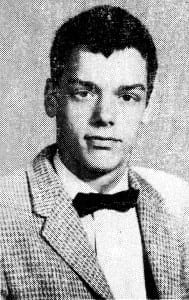MCHS bio for Jaan Pill, class of ’63 – May 27, 2014
My name is Jaan Pill (MCHS ’63). I was president of the Student Council at Malcolm Campbell High School. A key thing that I remember from MCHS is that Jenning Dai nominated me to run for the office of president. Jenning told me I should run for office because he’d noticed I was always outspoken in expressing my opinions in English classes. I rehearsed my campaign speech endlessly. The speech went well, many people – including Scott Munro who served as our campaign manager – helped me organize our campaign and I won the election. Scott did the photography for our campaign posters and also helped us craft the slogans.
My campaign speech, which I delivered on two occasions to a packed house at the MCHS auditorium – I remember Mr. Lewis standing way at the back watching intently – was based on a key theme from the John F. Kennedy inaugural address of Jan. 21, 1961. The JFK speech includes the classic line: “Ask not what your country can do for you, ask what you can do for your country.”
Various people have suggested who originated the text in the 1961 JFK inaugural address; many theories exist. I modelled the text and cadences of my Student Council campaign speech on the inaugural address and practised it day after day, standing at the top of the stairs at our house on Lavigne Street in Cartierville.

Jaan Pill. The photo is by Walter Psotka, who is also the official photographer for the MCHS 2015 Reunion taking place at Old Mill Toronto on Oct. 17, 2015.
My campaign speech, as best as I can recall, began with the words: “In your hands, instead of mine, will rest the final success or failure of the Student Council.” All that happened over fifty years ago. John F. Kennedy was still in office at the time.
My other minor claim to fame is that, at the MCHS June 1963 graduation ceremonies, I received an award for Academic Achievement in English. I’ve always enjoyed the study of language; it’s my belief that we shape our stories and our stories shape us. That’s been a key principle in my community self-organizing work over the years. My own story is a small one, in the larger scheme of things. Many other grads and people in general have stories that vastly surpass my own, but each person’s story has value, I believe, and warrants celebration.
After graduating, it took me a while to find my way. Eventually I became a teacher, because I noticed that infants and toddlers were convinced I was a celebrity. I began as a substitute teacher at a day care centre and later became a public school teacher. Among other grade levels I taught elementary school. My favourite activity was arranging role plays and dramas created by students. People had such a great time, and so many kids found out that they had a flair for drama that they had not really ever tuned into before, except possibly they had tuned into it in very early childhood and had then forgotten about it. Live music, live dance, live drama: People have so much fun!
The person that we are in high school
I’m the same person I was in high school and also a different person. Our sense of self and our personality changes over time, while some things about us stay the same. My voice as a writer, as a blogger, is the voice I developed writing for audiences of fellow students, and teachers, when I was in high school. I like to think I’ve mellowed a bit, and am slightly less opinionated, but it’s the same voice. In working on the reunion, I’ve also developed a real appreciation for the highly developed writing skills of other 1960s-era MCHS students – among them Howard Hight and Diana Redden among many others.
I’m a beginner practitioner of mindfulness. A page devoted to my interest in this area (see link in previous sentence) has received a good number of page visits. Until I checked the site statistics, it would not have occurred to me that many people would want to know about my reflections upon the topic of mindfulness.
From early childhood, through my adolescence and even now, I’ve been fascinated with a simple question: How do we make sense of the world? How do different people arrive at their characteristic ways of seeing the world, and operating as agents – developing and manifesting a sense of agency – within it?
I retired from the Peel District School Board in 2006. I am married and have a daughter. My wife will attend the reunion. I enjoy doing volunteer work with a focus on community self-organization. I have a website called Preserved Stories.
I’ve lived and worked across Canada and have travelled elsewhere. In 1990, I delivered lectures in Estonia that led to the founding of the Estonian Stuttering Association. I’m also co-founder of the Canadian Stuttering Association and the International Stuttering Association. I enjoy talking, writing, and listening.


Hi Jaan!
I enjoyed your bio. You certainly have had an interesting life. Since you are at least a couple of years older than I am I do not remember you from MCHS. No doubt we lived close to each other. I was on O’Brien near the corner of Dudemaine.
Years ago I wrote a letter to Mrs. Meeks and she replied with a very nice letter. She thought that MCHS was a wonderful school. Don’t we all? She did say though that she found it odd that the school was built where it was. I found that odd because there were kids everywhere in the neighbourhood. Only in the later 70’s did they have to bring in kids from Pierrefonds and Roxboro.
David
Hi David!
It’s wonderful to have the opportunity to get to know you now, even though we did not know each other at MCHS. It’s a real treat to be able to use Google Maps to quickly refresh my memory, in order to picture in my mind where the corner of O’Brien and Dudemaine is located.
I’ve enjoyed learning about your story, through your comments. You must have some great stories to share about working as a teacher and principal. I very much like the concept that as MCHS alumni, we can learn from each other these many years later, even though we may not have had any meetings at all in high school. What matters, I think, is that we grew up in more or less the same times and in more or less the same neighbourhoods.
Mrs. Meeks was my teacher in Grade 10, if I recall correctly. She taught grammar really well. There were some fine points that I picked up then, that I still remember now. Some changes have occurred in how punctuation marks (such as periods, commas, exclamation marks) at the end of sentences are handled, on occasions where quotation marks are used to indicate direct quotations. I find that so interesting, how points of usage, and language in general, has changed in subtle ways over the years.
Also, in terms of my personal experiences, my stuttering was particularly severe when I was in Grade 10. As I look back, I like that fact that she maintained a sense of equanimity, even on those occasions, such as when making a presentation, that I would have a severe block on a particular word, and it would take me a long time to say what I wanted to say.
I’m pleased to say, as I’ve said on these pages from time to time, that eventually I attended a three-week stuttering treatment program at a speech clinic in Edmonton, and then spent many years practising my new fluency skills every day, and in that way learned to maintain my new fluency skills and to apply them in everyday life. The visit to Edmonton changed the direction, the trajectory, of my life.
It’s such a delight, even these many years later (I went to Edmonton in July 1987) to be able to say what I want to say, without a concern that I would have to struggle through many of the words, each time I formulate a sentence. The gift of spoken language is a wonderful part of being human. Just being able to speak freely gives me so much pleasure.
Jaan
Hi Jaan!
I feel the same way as you do about the opportunity to connect with people again via the Internet. A lot of the time I actually call it the anti-social network but the pros outway the cons I think. The Internet has been a great thing for those people like myself that are in the car hobby.
The Internet hasn’t done much for the English language. A lot of the time I have to figure out what people are trying to say.
Mrs. Meeks was a fine teacher. I only ever had her for history or geography. We used to call her Mother Meeks because she was like a mother to us and initialed her name as M.M.
For awhile I was a paid member of classmates.com but I didn’t keep it up because there wasn’t much new happening on the site. I left my profile up however. Some things did get deleted somehow but it is mostly still there. If you don’t pay you can’t do much on the site.
David
Hi David!
Cars are a great area to be involved in.
One of our Events Committee members, Lynn (Hennebury) Legge, who lives in London, Ontario, has close relatives living in Calgary. She travels back and forth. There are quite a few MCHS alumni out in Alberta and B.C.
Diana Redden, of the Database Team, lives in Langley, B.C. A math teacher, Miss Carr, moved to Victoria, if I recall correctly, after she retired. I think a number of MCHS teachers retired out that way, but I’m not certain.
Jaan
At times I think about the line from John Kennedy’s inaugural speech, which I’ve noted in my high school biography: “Ask not what your country can do for you, ask what you can do for your country.”
In time, the rhetoric associated with that particular stage of history turned out to be at variance with the reality. That is what stands out, among other things, when we read the history of the Kennedy era. The distinction between rhetoric and reality is a point I often think about.
Over the years, I have at times encountered situations where the rhetoric associated with the above-noted quotation is in line with the reality. I’m thinking of situations not in terms of “doing things for one’s country,” but of things on a more limited scale, such as “doing things for one’s community,” or “for one’s neighbourhood.” When I encounter such situations, in which rhetoric and reality are closely matched, closely aligned, one with the other, I feel a strong sense of inspiration – a sense of things being right in the world.
The other side of the equation – that is, the quality of the reality that is associated with the rhetoric – has also become a strong source of interest for me, with the passage of the years. That is: What is the evidence for a particular statement, a particular report or observation, a particular exercise in rhetoric? What is the quality of the fact-checking? When the rhetoric is inspiring, and the evidence related to the rhetoric is also strong and robust, that is when I feel at ease.
What I’ve described concerns one person’s reflections, based on that person’s particular mindset and life experiences. Other people will have arrived at quite different unique reflections. All such reflections are of interest to me.